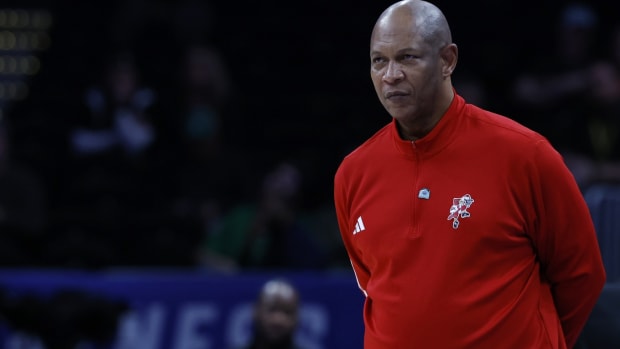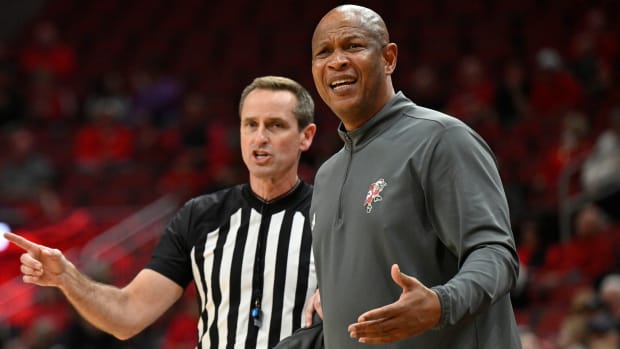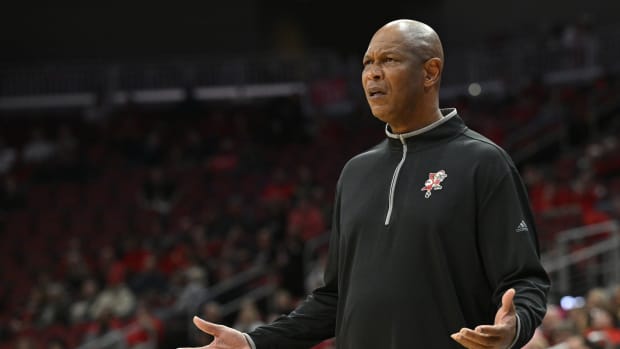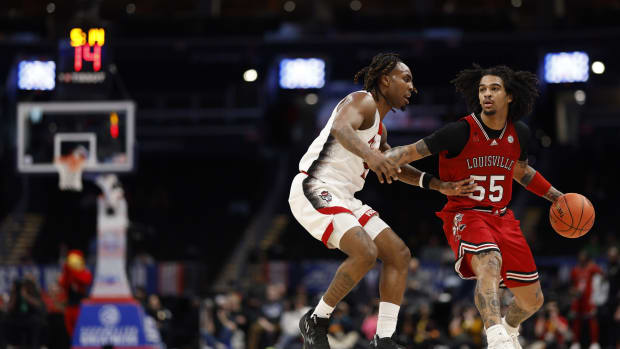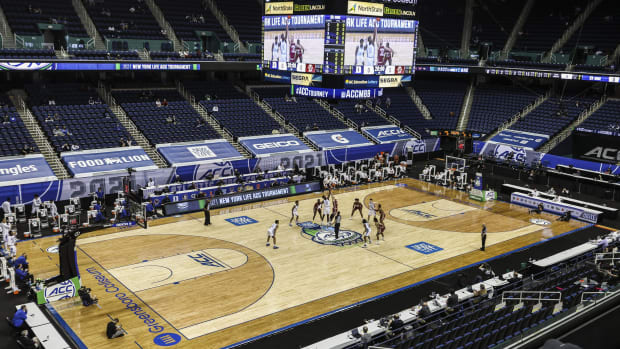Breaking Down Louisville's New-Look Backcourt
LOUISVILLE, Ky. - It has been a whirlwind of an offseason in terms of roster management for the Louisville men's basketball program. It's a roster that now features more newcomers than returners, as six players departed the program, but eight came in to replace them and fill the available scholarships.
Where the Cardinals look the most different is in their backcourt, as all of their scholarship true guards from the 2020-21 season are now gone. Carlik Jones and David Johnson are in the NBA; Josh Nickelberry transferred to La Salle, and Charles Minlend opted not to take advantage of an extra year due to the lingering knee injury he suffered before the season.
Countering losing their entire backcourt, head coach Chris Mack and the rest of the Cardinals coaching staff were able to replace all four that departed. El Ellis is joining after two years in the JUCO ranks, Jarrod West and Mason Faulkner came over as a graduate transfers from Marshall and Western Carolina, respectively, and Noah Locke transferred from Florida.
Here, we'll take a look at what each new guard brings individually and collectively, identify some potential strengths and weaknesses, and then draw a conclusion as to if the backcourt is an improvement over last year's.
First, we'll start with Jarrod West, who will likely be the day one starter at the point guard position. The 5-foot-11, 181-pound Clarksburg, W. Va. native is Louisville's best ball distributor heading into the season, as he averaged 6.0 assists (12th in D1) to just 2.1 turnovers last season.
He will likely see court time in situations where Louisville is in need of defensive stops, as he averaged 2.5 steals last year as well. In fact, his 254 steals are the most in Marshall history, and the third-most among active Division I players. He also averaged 12.5 points and 3.5 rebounds per game in 2020-21.
Now let's move on to Mason Faulkner, Louisville's most recent addition. The 6-foot-1, 190-pound Glasgow, Ky. native is probably Louisville's best overall playmaker at this point in time. He not only scored 20+ points in 21 of his 53 games at Western Carolina, but has the only two triple-doubles in WCU history. He put up 16.9 points, 5.5 rebounds and 4.8 assists per game last season.
Plus, he shows up in the big moments. In road games against Georgia, Florida State and Xavier during his redshirt junior year, he averaged 18.7 points, 5.7 assists and 3.0 rebounds. He also connected on three game-winners during his redshirt senior season - including one against UNC Greensboro in the SoCon Championship.
So, why do I not see Faulkner starting at point guard right out of the gates? That's because he was only added to the program in mid-August, whereas every other guard newcomer joined in early June. They have the added luxury of two-plus months of system familiarity, and overall comfort with Louisville.
Next, let's take a look at JUCO addition El Ellis, who is a playmaker in his own right. SI All-American's Director of Basketball Recruiting Jason Jordan said in his scouting report of him that he is "an efficient three-level scorer with a high basketball IQ" and that he is "great at controlling pace and really knows how to pick his spots well". The 6-foot-3, 170-pound Durham, N.C. native averaged 17.7 points, 3.4 rebounds and 4.3 assists last season, and is a two-time Panhandle Conference Player of the Year.
Ellis gives Louisville a bit more flexibility in the backcourt, as he demonstrated superb ability to play both on and off the ball down at Tallahassee Community College. He spent a little more time as a two guard in his JUCO stint, but has stated that he would like to see more on-ball reps. Ellis might not have the experience that West or Faulkner has, but you can argue that he has a higher ceiling than either.
Finally, we have Noah Locke. Louisville struggled to shoot the ball through much of the 2020-21 season, and Locke is the Cardinals' biggest remedy for this issue. He was Florida's top three-point scorer with a team-best 57 threes and 40.4 three-point shooting percentage as a junior, along with a 43.2 three-point shooting mark as a sophomore and a Florida freshman record 81 connected triples.
While there will be some jockeying for the starting point guard spot for the aforementioned three players, Locke is your set-in-stone day one starter at shooting guard. But like Ellis, he has also stated that he wanted to play more on the ball than in his time at Florida. In high school, he was known as a combo guard, whereas the Gators used him almost exclusively as a spot up shooter.
With two primary point guards, and two combo guards who want to play more on the ball in 2021-22, it will be interesting to see how Chris Mack determines who will be the primary ball handler in what situations. This will certainly be something to monitor as the preseason and season itself progresses.
What this current group of guards brings is that everyone is a playmaker in some form or another, whether that be defense, ball distribution to get the offensive flow going, or straight up scoring. There isn't one guard that necessarily fits all options and is a universal playmaker, but Louisville at least has options.
This group's biggest strength is, without question, their ability to shoot the three ball. Mack made it a priority to bring in shooters all over the team, and the backcourt was no exception. Last season, Locke connected on 40.4 percent of his threes, Ellis hit 41.7 percent at the JUCO level, West shot 40.8 percent and Faulkner at 35.5 percent. Unless the Monstars suck out Louisville's collective three-point shooting talent, this should not be an area of concern in 2021-22.
An added benefit to this new backcourt is that it will properly allow Louisville to operate at a much faster pace than the previous year. Bringing on assistant coach Ross McMains to revamp the offense in terms of pace, is nice, but it would have been hard to do so without the proper personnel. Regardless of the depth chart, Louisville now has both a starting and backup backcourt, which is a vast improvement over last season, when they relied on Carlik Jones and David Johnson to play nearly 40 minutes every night.
If there is any knock on this group, at least at the current moment, it might be their defense. While West was a defensive star at Marshall, time will tell if that translates to the ACC given his small frame. Locke and Ellis give Louisville a bit of size with their 6-foot-3 frames, but defense has not been the calling card of their basketball careers up to this point. Again, time will tell how this will pan out over the next few months.
So now we have the question: is this backcourt an improvement over last year's?
Yes, Louisville had the ACC Player of the Year runner-up in Carlik Jones. Yes, Louisville had an eventual NBA Draft pick in David Johnson despite having a noticeable second-half slide. But you can make the argument that Louisville is in a better position now because of quality depth.
Josh Nickelberry missed a variety of games due to injuries, and was flat out unreliable when he did touch the floor, as he was a shooter who struggled to do just that. Charles Minlend was never what he was at San Francisco due to that preseason knee injury, missing nearly the entire season because of it. Louisville was forced to play Jones and Johnson almost nonstop both to even have a chance to win, and because of the available players at times.
Barring more awful injury luck to the Cardinals, they won't have to force anyone in the backcourt to play nearly full games night-in and night-out. Jones and Johnson could end up being slightly better than any guard currently on the roster, but you can also make the argument that the overall talent in the room is an improvement over last season.
As previously stated, time will tell if the pieces in the backcourt are able to work in sync, or if their respective skill sets translate to the best basketball conference in Division I. But as of this moment, Louisville has to feel good about the state of their backcourt.
(Photo of Jarrod West, El Ellis: University of Louisville Athletics)
You can follow Louisville Report for future coverage by liking us on Facebook, Twitter and Instagram:
Facebook - @LouisvilleOnSI
Twitter - @LouisvilleOnSI
Instagram - @louisville_report
You can also follow Deputy Editor Matthew McGavic at @GeneralWasp on Twitter
